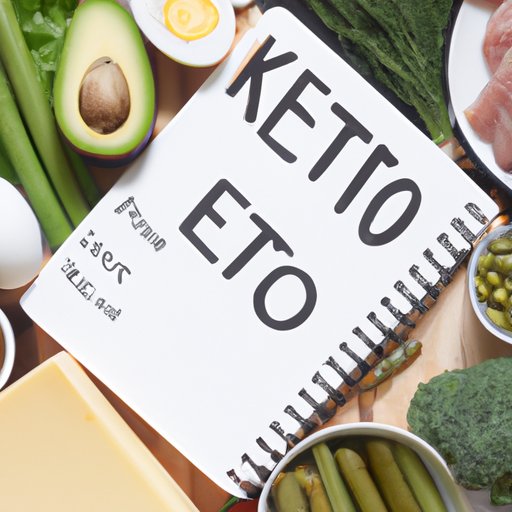
I. Introduction
Are you struggling to maintain a low-carb keto diet? Carbs are an important macronutrient, but they can be tricky to balance on a keto diet. This article will cover everything you need to know about carbs in a keto diet – from determining the right carb intake to incorporating healthy sources of carbs into your diet. By the end of this article, you’ll have the knowledge and tools to maintain a healthy low-carb lifestyle.
II. The Basics of Carbs in the Keto Diet: What You Need to Know
A keto diet is a high-fat, low-carbohydrate diet that induces ketosis, a metabolic state where the body burns fat for fuel instead of glucose. Carbs are restricted on the keto diet to promote fat burning and weight loss. However, not all carbs are created equal – some carbs may be more suitable for a keto diet than others.
Carbs fall under two broad categories: simple carbs and complex carbs. Simple carbs, such as sugar, are easily broken down by the body, leading to rapid spikes in blood sugar levels. Complex carbs, such as those found in vegetables and whole grains, take longer to break down, and provide sustained energy. On the keto diet, it’s recommended to limit your daily carb intake to 20-50 grams per day to achieve and maintain ketosis.
III. The Beneficial Role of Carbs in the Keto Diet
Although the keto diet is notoriously low in carbs, it’s important to consume healthy sources of carbs to support various bodily functions. Carbs are a source of energy, aid in digestion, and provide essential nutrients for the body. You can incorporate healthy sources of carbs such as non-starchy vegetables, nuts and seeds, and berries, while still maintaining ketosis.
Additionally, incorporating healthy sources of carbs into your keto meal plan can help to alleviate side effects such as constipation, bloating, and low energy levels that can occur with an extremely low-carb intake.
IV. Are You Eating Too Many Carbs on the Keto Diet? Here’s How to Tell
Consuming too many carbs can kick you out of ketosis, leading to decreased fat burning and increased cravings. Some symptoms of consuming too many carbs on keto include weight gain, fatigue, and intensified hunger and cravings. To ensure that you are staying within your daily carb limit, it’s important to track your carb intake, read food labels, and be mindful of carb-heavy foods such as bread, pasta, and sugary drinks.
Reducing carb intake can be challenging but try replacing high-carb foods with low-carb alternatives and eating more healthy fats. Incorporating moderate physical activity can also help to burn excess carbohydrates and blood glucose and promote overall health.

V. Maintaining the Right Carb Intake on the Keto Diet: Tips and Tricks
To ensure that you are maintaining the sweet spot between low-carb and healthy carb intake and avoid going over the daily recommended intake, try meal planning your meals, using a food tracker, and researching new, delicious low-carb recipes. There are also keto-friendly companies out there that offer low-carb foods, snacks, and supplements that can help you boost your energy levels and curb your cravings.
It’s important not to deprive yourself too much on the keto diet so treat yourself with low-carb snacks and desserts that will satisfy your sweet tooth without going over on carbs. The key to success on the keto diet is to find a healthy balance that works for you.
VI. Carbs and the Keto Diet: Recipes That Will Help You Stay on Track
If you need some inspiration to stay on track, there are plenty of delicious and healthy recipes that are perfect for the keto diet and low in carbs. Some great low-carb recipe ideas include cauliflower crust pizza, zucchini noodles, and keto-friendly fat bombs. Incorporating healthy carb sources such as leafy greens, berries, and nuts can also give your body the essential nutrients it needs.
Cooking and meal prepping your food is another great way to maintain your desired carb intake. Plan well-balanced and healthy meals in advance, and store prepped meals in the refrigerator or freezer. This way, you can ensure that you have healthy meals available when you need them, and avoid temptations to cheat on your carb intake.
VII. Carbs and the Keto Diet: Debunking Common Myths and Misperceptions
There are many myths and misconceptions surrounding carbs on the keto diet. For example, some people believe that eating carbs on the keto diet is strictly forbidden, but this is not true! As mentioned earlier, incorporating healthy sources of carbs aids overall health and promotes successful weight loss.
Keep in mind that the quality and type of carbs you consume can have an impact on your health and ketosis. It’s important to avoid processed and refined carbs, and instead focus on getting nutrients from natural and healthy carb sources like veggies, fruits, and nuts.
VIII. The Impact of Different Carb Sources on the Keto Diet: A Comprehensive Guide
Choosing the right carb sources is vital when it comes to maintaining a healthy low-carb keto diet. To avoid excess carbs and ensure the best possible nutritional profile, foods that are high in refined sugars, grains, starches, and legumes should be avoided. These foods are high in carbohydrates and can cause a rapid increase in blood sugar levels, sabotaging your ketosis. Instead, incorporate healthy low-carb carb sources such as avocados, mushrooms, and sweet potatoes.
IX. Conclusion
The keto diet can be an effective way to lose weight, boost energy levels, and improve overall health. It emphasizes a low-carb intake, but it’s important to ensure that you are consuming enough healthy sources of carbs to meet your energy needs and avoid side effects. With the right knowledge, tips, and tricks, you can maintain a healthy low-carb lifestyle and enjoy all the health benefits that come with it.





